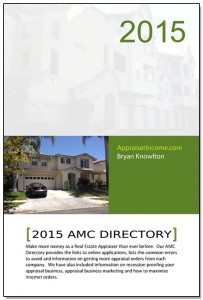[Update 1: Updated on May 20 with new list of state-approved AMCs. The new list is dated May 18.]
While the rest of us were going about our business this week, appraisals in the state of Illinois came to a dead stop after the Illinois Department of Financial and Professional Regulation revoked the licenses of 70 of the state’s major appraisal management companies due to non-compliance with the state’s bonding requirements.
The cancellation of the AMCs’ licenses set off a firestorm that left appraisers prohibited from working with the suddenly unlicensed AMCs.
According to sources inside the industry, many of the affected AMCs said they were caught completely off guard by the cancellation of their licenses.
The state, on the other hand, claims that AMCs were fully aware of the situation.
In the May issue of the IllinoisAppraiser newsletter issued by the Department of Financial and Professional Regulation’s Division of Real Estate, the state’s appraisal management company coordinator writes that the vast majority of the state’s AMCs were not in compliance.
In a section titled “AMCs and Compliance,” author Brian Weaver, AMC coordinator for the Division of Real Estate, said that the state’s AMCs were “astonishingly poor” at complying with the state’s rules.
“Some AMCs, like some appraisers, are better at compliance than others,” Weaver writes.
Weaver then presents a copy of the state’s bonding requirements, which reads as such:
Section 1452.80 Bonding Requirements
The bond required by Section 50 of the Act shall be fora term concurrent with the term of the registration, commencing with registrations issued by the Division with an expiration date of December 31, 2014 and concurrent with the 2-year term of each renewed registration thereafter. This provision does not prohibit the registrant from maintaining a continuing bond during any registration term. Failure to maintain the bond and to provide the Department with written proof of the bond, upon request, shall result in cancellation of the license without hearing.
Weaver goes on to say that the AMCs bonds were “set to expire all over the calendar,” and that only nine of the AMCs operating in the state were able to comply with the bonding rule.
“It became so problematic that I finally had to send 150+ letters to the remaining AMCs that they needed to comply or face cancellation,” Weaver writes. “Compliance at a rate of of 9 out of 165 is astonishingly poor.”
Click here to read the IllinoisAppraiser May newsletter in full.
But sources tell HousingWire that many of the state’s AMCs, including several large operators, did not receive those letters and had their licenses canceled on Monday without any other warning or the possibility of a hearing.
In the wake of the cancellation, the Illinois Coalition of Appraisal Professionals sent an email to its members that the state had canceled the licenses of 70 AMCs, saying that the state had asked the Coalition to notify its membership that they were now prohibited from accepting work from the unlicensed AMCs.
In that email, which was obtained by HousingWire, the ICAP includes a state-provided list of non-compliant AMCs in a PDF file. The PDF file was hosted on the Illinois Department of Financial and Professional Regulation’s website, but the link to the PDF file is now dead.
The ICAP email also included a copy of a letter purportedly sent by the state to all AMCs who hadn’t provided their updated bond information when they renewed their license for 2015.
The ICAP email states that the letter to AMCs was sent on March 30 and warns the AMCs that they must comply with the state’s rules by May 1 or risk cancellation of their license.
A link to a copy of that letter was also included. The link was a PDF file hosed on the Illinois Department of Financial and Professional Regulation’s website, but the link to the PDF file is also now dead.
In many cases, the AMCs learned of their license cancellations from appraisers who told them they would be unable to fulfill their contracts.
In the subsequent days, AMCs from all over the country began bombarding the Division of Real Estate’s office with their bonding requirements, but with many of the state’s largest AMCs unable to fulfill contracts, appraisals in the state came to a screeching halt.
On Tuesday, just one day after suspending the licenses of 70 AMCs, Weaver and the Division of Real Estate posted the following on the state’s website (text presented exactly as in Weaver’s letter, italicization included):
Given that most of the AMCs have been overnighting packages with original documentation to Springfield, we will be repopulating and re-posting the List as AMC entities are verified as compliant.
The License Look-up shows ALL 170+ AMCs as active and appraisers are free to receive and work their assignments.
Given the anticipated volume of documentation being received in Springfield, it may be until the end of next week before we can tell precisely who has complied.
Click here to read Weaver’s letter in full.
The state also posted a list of compliant AMCs on Thursday, but a comparison between the May 14 list and a similar list from June 2014 shows many AMCs removed from the licensed list, although as Weaver’s letter states, all of the AMCs that were licensed before Monday are still allowed to operate in the state while the Division of Real Estate sorts through the AMCs’ bonding materials.
Click here to see the May 14 list of approved AMCs. And click here to see the list of AMCs licensed as of June 2014.
HousingWire reviewed the state’s website again on May 20 and found an updated list of approved AMCs, dated May 18. The new list shows several more AMCs that are now approved by the state. Click here to the see the May 18 list.
Despite the licensing issue being resolved with two days, that didn’t prevent hundreds or perhaps thousands of appraisals from being delayed.
HousingWire attempted to contact Weaver via email to discuss the situation, but received an out of office reply, indicating that Weaver would return to work on Friday.
HousingWire also sent an email to the Division of Real Estate about the issue but did not receive a response.
HousingWire also voicemails with Luisa Rivera, the administrative assistant for the state’s appraisal board and Mary Bates, the board’s liaison, but, as of press time, has not received a response from either.
http://www.housingwire.com/articles/33901-heres-why-illinois-appraisals-came-to-a-dead-stop-this-week









